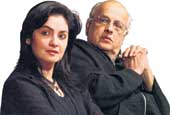 |
| Daddy’s girl: Pooja Bhatt with Mahesh Bhatt |
I don’t know what it was that made me tag along to the 49th anniversary of the Alcoholics Anonymous one sultry Sunday morning last month. My father was pleasantly surprised and the organisers delighted to have an additional ‘Bhatt’ to grace the occasion. I apologised for crashing their party but they smiled delightedly and tried to coerce me into giving a speech. I clammed up immediately. What would I say at such an important occasion?
I knew that I was certainly no expert and could not pretend to educate a room full of doctors, intellectuals and, most importantly, alcoholics on the topic, or hope to inspire them to continue to stay on the wagon. I scanned my memory bank for facts, terms, a smart quote perhaps. But nothing came forth. When I feigned ignorance and tried to be let off the hook, I was firmly led up to the dais and asked to speak from my heart.
“Come on Pooja, you’ve experienced my alcoholism so vividly and closely, you have a living reference point. Share your experiences. That’s what people want,” urged my father. So I took a deep breath and reluctantly agreed to go on.
Everyone has his or her own take on alcoholism. Some view it as a medical malady, some see it as a psychological problem, while others view it as a social dysfunction or a moral weakness. A question that came up often that day was, “How do you know if someone is an alcoholic? How do you define them?” How much alcohol is ‘too much’ alcohol? And how often does one need to drink to be termed an alcoholic? Weekly? Daily? But then lots of people who call themselves alcoholics are not daily drinkers. My father put it in perspective by saying, “If you are truly an alcoholic, you know it. You might deny it to the whole world and especially to yourself, but deep down, you just know it.”
I grew up in a home with a father who was an alcoholic and saw my parents’ marriage crumble on account of it. A decade and a half later, I watched mutely as alcohol claimed a dear friend. She was 40 and an alcoholic who was totally in denial. One brilliant, blue-skied morning, she had a massive stroke. We watched her slip away a day later in a grim hospital room, helpless, dazed with grief.
And what did we do that night to fight our confusion and pain? We got together and mourned her death by numbing ourselves with a ‘drink.’
A few years later, I even got into a relationship with an alcoholic. My father warned me that I was heading for disaster but I chose to ignore him. I was foolish enough to believe that I could ‘rescue’ my alcoholic boyfriend somehow. But maybe it was me that needed rescuing ? a fact that became painfully clear when I found myself a victim of domestic, alcohol-induced violence which destroyed my faith in love and ensured that the gory details of my messy personal life were emblazoned across every newspaper in the country. Jolted back into reality, I swore off toxic relationships and the occasional glass of wine.
But then with time and life, something marvellous happened. My scars healed and I met the man I eventually went on to marry. Life was ablaze. I was happy again and foolish enough to drop my guard and do something that was anything but marvellous. I started drinking socially again.
I guess I must have been suicidal because it’s a known fact that children of alcoholics are FOUR times more susceptible to becoming alcoholics themselves, and there I was chugging away at the champagne every time there was cause to celebrate or bury my failures. How could I do that? Especially after experiencing the disastrous consequences alcohol has had on my family and my life ever since I was a little girl. It was time to do something about it. It was time to finally STOP.
A famous author once wrote that words are not simply “a darkness pulled out of us.” Rather, they are an attempt to ‘pull out’ the darkness, expose it to light, let it burn away the veil that keeps us from reconciling with our parents, our families, our inner ghosts and erasing the carefully buried pain. I did all of the above on the dais that Sunday morning ? but most importantly, I did the most essential thing of all. I put my hand up and pledged to be ‘responsible’. The first and only step that Alcoholics Anonymous implores you to take.
The audience, generous beyond belief, rose to their feet. I was overwhelmed to say the least. But through my tears shone a clarity and strength. It was a spiritual feeling, and I vowed never to have another sip of alcohol again.
And I won’t. Not to enhance a win, numb a failure, celebrate the birth of a friend’s child or even my own, to relax, forget, remember or the countless other excuses we use to justify having a drink. And as I walked back to my seat, still slightly shaky with emotion, I felt healed, liberated, free. That morning was one of the most cathartic experiences of my life. Not because I was able to speak bluntly about my father’s alcoholism and the tragic circumstances we sometimes lived through on account of it. But because I finally garnered the strength to recognise my own weakness and took the responsibility of ripping it from my being forever and flinging it into the distant, dark area of a now forgotten time ? a time when I will be “responsible” enough to never revisit again.
As told to S. Ramachandran











